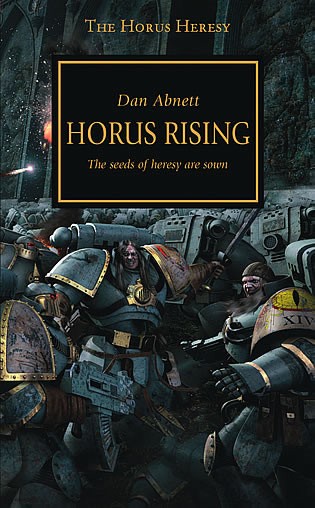The Horus Heresy is perhaps the most important part of the fundational myth of Warhammer 40k.
Even if you only ever grab a rulebook, you’ll be familiar with the Heresy due to how the current events of the timeline are shaped by it.
Once upon a time humans were at the peak of technological progress and spreads through the stars. Then, the machines go crazy and humanity reverts to different forms of barbarism.
Then a big dude in gold armor calling himself the Emperor of Mankind comes in and starts his crusade to reconnect lost human worlds. For this he creates squads of modified humans, the Space Marines, but for each Space Marine legion there is a “Primarch”, a genetically crafted demigod meant to be the commander of each legion. However, when they were babies they were spread through the cosmos and landed in different worlds, with the Emperor’s Great Crusade being initially as much to find them as it was to reconnect humanity.
The Horus in “Horus Heresy” is the name of the first Primarch that the emperor found, his favorite son that was there when the emperor found every other one of his sons (unless you believe Alpharius that he was the first, but you shouldn’t). After many victories the Emperor named Horus the Warmaster and left him in charge of the crusade. In this process, Horus alongside one half of the Primarchs betrayed the emperor, which ultimately results in Horus mortally wounding the emperor, forcing him to take place in The Golden Throne, where he’s kept alive by the sacrifice of thousands of psykers on the daily.
But what if the heresy wasn’t as simple a matter as just “Horus went crazy”? What if there were other cogs in that machine? What if a “Heresy” was inevitable by design and Horus just happened to be at the wrong place in the grand scheme of things?
And more importantly, how the fuck do you tell a tale where the ending is a foregone conclusion?
By making said foregone conclusion creep on you, like a train crash in slow motion that you can’t stop and see coming.
“I was there the day that Horus slew the Emperor”
Those are words attributed in apocryphal manner to any number of witnesses of the final battle between the emperor and Horus, and are the words with which this book opens. Because you see, they’re meant to echo the foregone conclusion that anyone opening the book would be aware of and also describing an unrelated event.
The “Emperor” is actually the regent of a small empire that the Luna Wolves, later renamed to Sons of Horus, fought. The first novel opens in this conflict and it sets up many different elements at once.
The first is that the “emperor” causes the murder of Hastur Sejanus, which was not only one of Horus’ most beloved warriors, a death that he never truly recovered from. This death leaves open a spot for Garviel Loken, the effective protagonist of the novel, into Horus’ “Mournival” (his inner circle of confidants).
Tied to this is the second point, through Loken and many other scenes we see that Horus is a very charismatic person. Whether a calculated move to play to the crowd or a sincere humility (and there’s reasons to believe either) it’s easy to see that Horus was chosen as Warmaster for a reason, making you ponder about why (or indeed how) he falls.
And the third point is that the novel has this very pronounced and borderland blunt element of “GEE I SURE HOPE THIS ONE THING WE’RE TALKING ABOUT DOESN’T COME BACK TO BITE US WITH THE FULL STRENGTH OF IRONY IN THE NEAR FUTURE!!”.
To Horus Rising’s credit, however, it actually adds a lot to the narrative. It’s what makes the evolving tragedy so poignant, seeing what once was, what was once held as sacred, and feeling the echoes of how it will all go wrong.
For example, one of my favorite bits of worldbuilding in 40k is the fact that the Boltgun, the Space Marine firearm of choice and effectively a single-handed RPG, isn’t effective against Space Marine armor because back then the thought of a Space Marine raising his hand against another one was unthinkable.
Was.
It’s a narrative device that in lesser hands would’ve resulted in something anywhere from clumsy to patronizing, but luckily Horus Rising was written by Dan Abnett. For those that don’t know, within the 40k novel stuff Dan Abnett is one of the premier authors for the franchise, and while his work might not be my cup of tea most of the time just from very specific personal preferences, I know a good writer when I see it and by God that Abnett guy can write good.
All the looming and constant foreshadowing also helps mitigate one extra snag.
This book is an introduction. Without spoiling too much, you don’t see the proper aftermath or even the mere results of what’s happening currently until the next novel, so having all those looming threats, all those moments of WE’RE HERE TO PROTECT THESE HUMANS! WE’RE HERE TO PURSUE THE TRUTH!! that scream THESE HUMANS ARE GOING TO DIE AND THE TRUTH IS FOR THE BIRDS!! makes it all feel less like you’re just sitting through a glorified prologue.
The novel ends with an encounter with the “Interex”, an advanced human civilization that Horus actually tried to negotiate with despite ideological clashes and many in his staff recommending to just kill everyone as per usual. The negotiations fell through, however, after Erebus of the Word Bearers steals a very dangerous artifact from them, killing any hopes of negotiation.
I love the Interex section for two reasons.
The first is a sort of fun outsider perspective. Loken chats with an Interex soldier that explains that they were wary of the Space Marines because if you see an overgrown and bloated super soldier in ominous armor it’s only safe to assume they were tainted by demons somehow.
The second is that it encapsulates one of those things people always bring up about 40k, the idea of “well, they should’ve shown some successful civilization to create the contrast and make it clear the Imperium are bad guys”.
First of all, 40k is ultimately a satire, and when they added a “successful peaceful civilization” they added the T’au which have a caste system and last I checked castes aren’t exactly a good thing to have. And second and more to the point, there might’ve been actually nice and successful civilizations, and they were all most likely scoured, if not by the Galactic Super Fascists, then by… really any other of the Galactic Super Fascists, or the Bugs, or the Orks.
In current day 40k (oh yeah the Horus Heresy is technically 30k btw) the Astra Militarum, the non Space Marine tide of human soldiers, are equipped with weapons and armor that would turn any single one of them into a one man army in our world in current day… but because The Great Crusade of The Emperor killed everything that wouldn’t stand a chance against it, it stands to reason that the only things left in the galaxy are the ones that CAN stand against it.
And so, despite the Interex having a progressive civilization with even more super advanced technology, they’re not the civilization that has only known war for at least 5000 years INDEPENDANT OF EACH OTHER BEFORE THE EMPEROR STARTED VISITING PLANETS by the time of 30k.
I said it before and I’ll say it again, needing clarification that every faction in 40k is bad is like needing clarification that arson is bad. An adult that’s part of society needing a clarifier that you do not, in fact, gotta hand it to Galactic Turbo Htler, feels like needing to clarify to someone that setting fire to things is not good.

My favorite part about this novel is the ending. Sure, they won against the Interex but every character is left with this feeling that everything they knew is slowly unravelling, and the reader is left (thanks to Erebus) with the very clear image that despite being called the Horus Heresy, this is all just the cracks in The Emperor’s plan showing and the goals of many others taking effect, and Horus just so happens to be in the middle of it.
Great novel overall, really good “I just bought a starter set with a rulebook and I wanna read one of them novels” pick.
Oh yeah. The Sons Of Horus/Luna Wolves are the 16th Legion, but the guy in the cover (and header for this post) has XIV (14) on it. It might be a squad number but out of all the numbers why pick the one that would look the most like an actual mistake?
